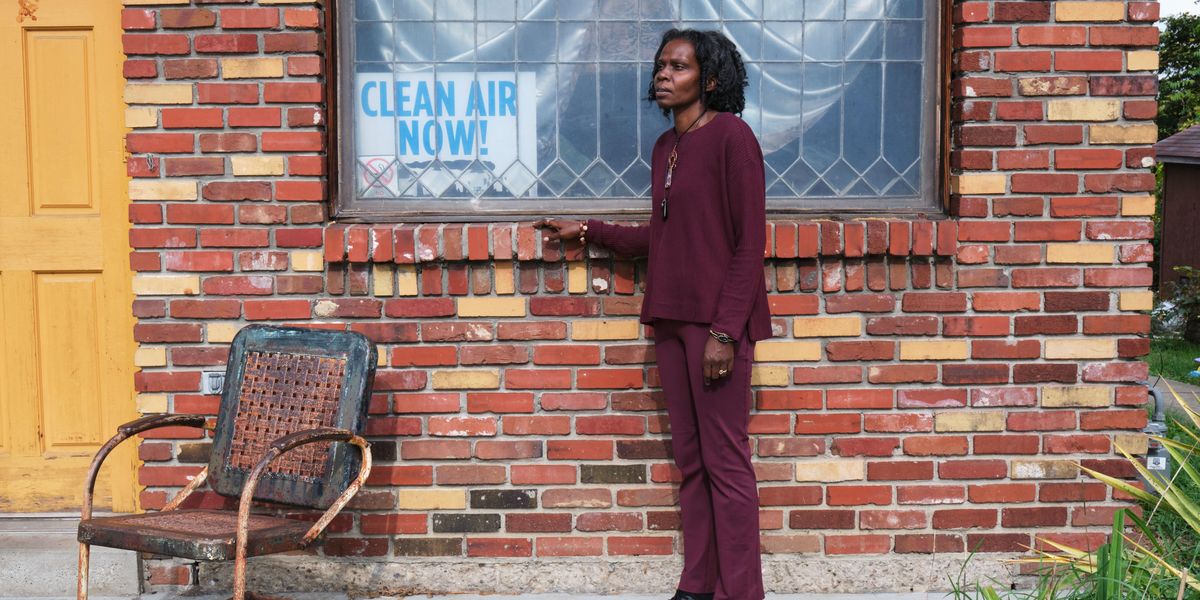
In 2013, Melanie had moved to a small town in North Carolina, where she was working toward buying an apothecary and establishing her own natural medicine practice, when her father died of heart failure associated with COPD.
When she returned to Clairton for his funeral, she planned to help handle his estate and spend some time grieving with the rest of her family before returning to her life in North Carolina. But while she was in town, her mom’s COPD took a sharp turn for the worse, and Melanie took over caring for her. Six months later her mom died too.
It was not long after, while Melanie was wading through the fog of grief, when she first learned about how bad the air pollution from the coke plant was. A local chapter of the Clean Air Council held a community meeting and shared that Clairton had high rates of both cancer and asthma, which they said were linked to the plant’s emissions. Melanie’s younger brother Tommy had childhood asthma. It had been terrifying for Melanie to witness him having asthma attacks and being rushed to the hospital, but she had never before made the connection between her family’s ailments and the coke plant’s ever-fuming smokestacks.
Both of her parents smoked, which Melanie knows was the primary culprit for their health issues. But she was surprised when others in the community dismissed the idea that pollution from the mill could also have played a role. “It seemed like there was an unspoken rule that everyone had to have loyalty to the company,” Melanie said. “I have never understood it.”
It’s a pattern she sees a lot. When friends and relatives develop cancer, they tend to blame themselves. “They’ll say ‘oh, it’s because I didn’t exercise enough, or I didn’t eat well,’” she said. “It’s been ingrained in them that it’s not anyone else’s responsibility.”
She pointed to a 2021 analysis in which researchers calculated that even if everyone in Allegheny County had quit smoking twenty years ago, the region’s lung cancer rates would only be 11% lower. Among the 612 other US counties in the study, lung cancer rates would have declined an average of 62% if smoking hadn’t been part of the picture over the last twenty years, indicating that environmental exposures play a substantial role in the region’s lung cancer rates.
“I’m not trying to tell people to ignore their own responsibility,” Melanie said. “But it’s very damning to a person’s spirit to think they’re at fault for their sickness, and that they failed by not being able to control their own health.”
After both her parents died, Melanie started attending more clean air meetings, finding that she felt better when she occupied her mind. At one such meeting she learned about a study that found kids in Clairton have asthma at more than double the national rate. “That’s when I decided I really had something important to do here,” she said. “Who could hear that and not want to scream and try to get Oprah on the phone and demand change?”
Before long she was speaking at meetings and sharing her own experiences with living in Clairton: the foul-smelling air, her struggles with epilepsy, the illness in her family, and her belief that everyone deserves a healthy environment. She still had the little apothecary in North Carolina in the back of her mind, but she wasn’t quite ready to go. Advocating for clean air in Clairton felt like her purpose—a continuation of her dad’s dedication to the community. And staying in her parents’ house made them seem still close by. As it turned out, any idea Melanie had of returning to her old life was short-lived.

The same year her mom died, Melanie’s oldest brother, Michael, died at age forty-five from congestive heart failure associated with COPD. Two years later, in 2015, her older sister Tammy died at age fifty-five from lung cancer. And in 2020, at age forty-one, her younger brother Tommy died from a blood clot in his lungs that may have been related to COVID-19. In the span of eight years, Melanie had buried every member of her immediate family.
Living in a more or less perpetual state of grief taught Melanie a lot about trauma, self-care, and resilience. There were times it felt like she was drowning. She sought therapy and briefly took antidepressants, but in the end she wound up relying more heavily on spiritual guides and community connections to heal.
Now, though there’s still sadness about losing so many people she loved, Melanie thinks of death more as a shifting spiritual state than an absolute end. Death has become so familiar that she’s considering certification as a death doula—someone who coaches the dying through their journey out of this world, much in the same way a birth doula coaches parents on bringing new life into the world.
“I think the traditional Western death experience leaves us feeling like victims, like we’ve suffered a loss and can’t get it back, and that’s not where I want to finish with death,” she said. “I’m interested in revisiting some of our older death rituals that can help people tap into feeling more empowered when they die.”
Coaching others through loss also taught Melanie how to keep going in her activism, even when it feels hopeless. “When I first started working in environmental justice, I felt awful when things didn’t happen as quickly as I wanted them to, or at the magnitude I wanted them to. But now I’m learning that when things aren’t going my way, I need to be able to find a place of peace. Sometimes when I stop looking for my way, I find that another way opens up.”
This is an excerpt from A New War on Cancer: The Unlikely Heroes Revolutionizing Prevention by Kristina Marusic. Copyright © 2023 by Kristina Marusic. Reproduced by permission of Island Press,Washington, D.C.

